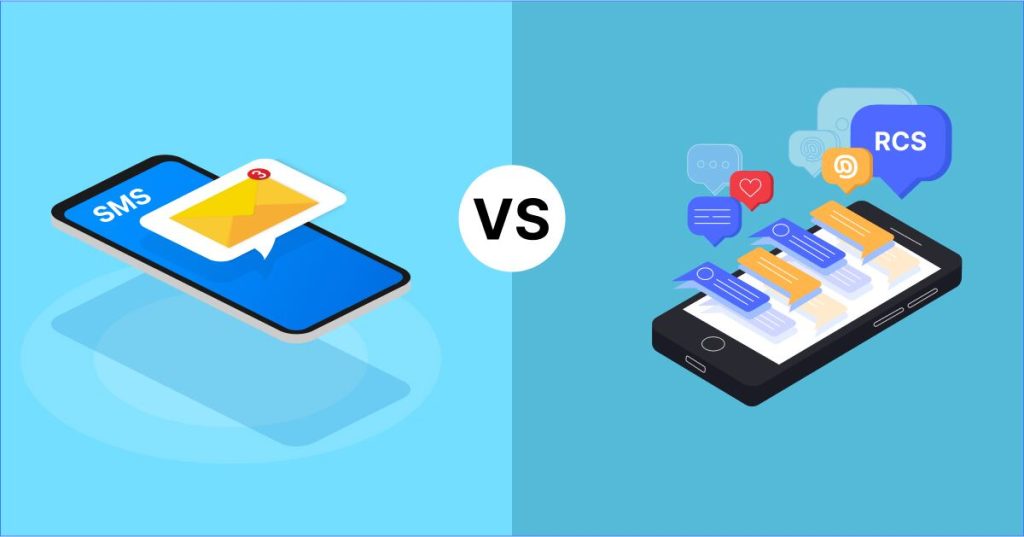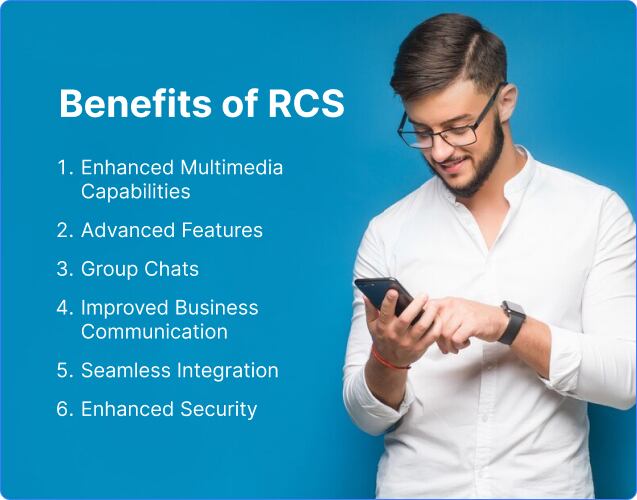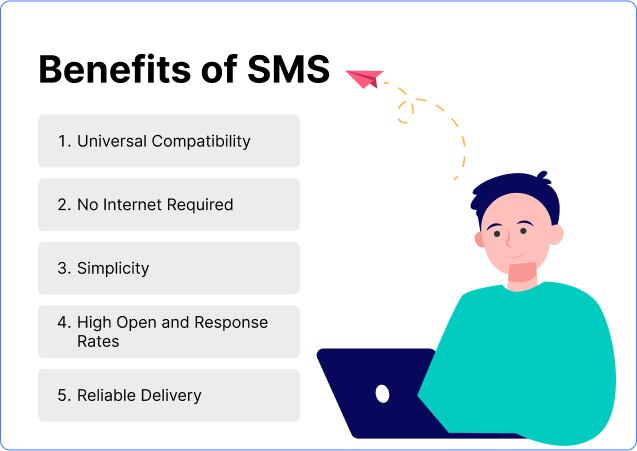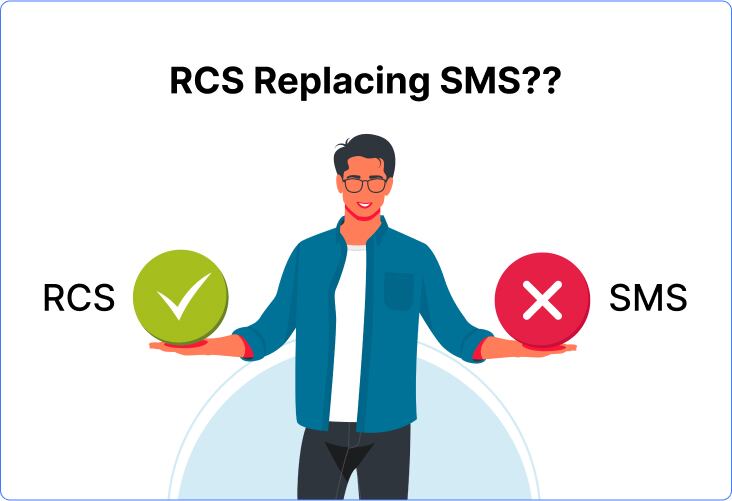
RCS vs SMS, which one do you think is the best for text messaging? A 2022 ‘ScienceDirect’ study shows that active mobile subscribers reached over 8 billion in 2020 which was less than one billion in 2000. A good portion of this number prefers text messaging over verbal communication, especially when they are in a hurry or need to convey urgent information. Why? It’s easier and faster, and it often costs less.
Advanced technologies have been easing communication on every medium and text messaging is not left aside. Until a few years ago, we could only use SMS if we needed to text someone. But now we have RCS to think about and that’s what we will do in this blog. We will compare RCS vs SMS messages, try to find out which one is better and why, and how we change from SMS to RCS.
What is SMS and How Does It Work?

According to Earthweb Research around 23-27 billion text messages are sent per day all over the world. But what is SMS? Come on! we all know what it is. We use SMS messages regularly to communicate with each other. Let’s dive deeper and explore the concept a bit more.
Short Message Service (SMS) is a text-based communication protocol that enables the exchange of short text messages, up to 160 characters, between mobile devices. Introduced in the early 1990s, SMS messages are transmitted through the cellular network, similar to voice calls, and do not require an internet connection. This makes SMS universally accessible and reliable, even in areas without Wi-Fi or mobile data.
The primary advantage of SMS is its simplicity and widespread compatibility, allowing nearly any mobile user to send and receive messages. Businesses frequently use SMS for customer service and marketing due to its reliability and broad reach. However, SMS has limitations, including its 160-character limit and the inability to send multimedia content like images, videos, or audio.
For multimedia messaging, the Multimedia Messaging Service (MMS) extends the capabilities of SMS. MMS uses the same cellular network but supports larger file sizes, enabling the transmission of images, videos, and audio files. Despite the rise of internet-based messaging apps like WhatsApp and Facebook Messenger, which offer advanced features and require an internet connection, SMS remains a crucial communication tool. Its ability to function without an internet connection and its universal compatibility ensure its continued global use.
What is RCS Chat?

Rich Communication Services (RCS) is a modern messaging protocol designed to enhance the traditional SMS experience with advanced features, similar to those found in popular messaging apps like WhatsApp and iMessage. RCS allows users to send high-resolution photos, videos, and audio clips, engage in group chats, receive read receipts, see typing indicators, and no characters limit, all within their phone’s native messaging app without needing additional third-party apps. It supports real-time interactions, such as branded messages and location sharing, and offers end-to-end encryption for secure communications.
RCS is an open standard, meaning it can be integrated into any device without interoperability issues. However, both the sender and receiver must have RCS-compatible devices and be connected to either Wi-Fi or an LTE/5G network. While widely supported on Android devices, Apple devices currently do not support RCS, defaulting to SMS for communication with non-RCS users.
For businesses, RCS provides a richer platform for customer interaction, enhancing communication with multimedia content and interactive elements, leading to higher engagement and conversion rates. RCS Business Messaging (RBM) includes features like barcode delivery, click-through options, and carousel messages, facilitating seamless customer experiences directly within the messaging app.
RCS vs SMS Message – Main Differences
RCS vs SMS can be discussed fundamentally in terms of their transmission methods and capabilities. SMS relies on the cellular network for transmission, functioning independently of internet connectivity, while RCS requires a data connection for message delivery. SMS is limited to 160 plain text characters, whereas RCS supports rich media like high-resolution images, videos, and interactive elements. Additionally, RCS offers advanced features such as read receipts, typing indicators, and group chats, making it a more dynamic communication platform than SMS.
While SMS enjoys near-universal adoption across all mobile devices, RCS requires newer devices and compatible carriers. Users must also manually activate RCS on their phones, leading to inconsistent availability. RCS vs SMS’s distinct characteristics and features serve unique purposes, with SMS remaining a dependable method for immediate, broad-reaching communications, while RCS offers a richer, more interactive experience tailored for modern messaging needs.
Here is a table to help you easily understand RCS vs SMS:
| Feature | SMS |
RCS |
| Usability | No app to download, found in native messaging app on all mobile devices | Need to activate from the default messaging app on Android devices |
| Reach | 100% of mobile phone users (approx. 7.3 billion) | Around one billion active Android users |
| Network Requirements | Requires cellular network | Requires internet connection (cellular data or Wi-Fi) |
| Character Limit | 160 characters per message | No specific character limit |
| Capabilities | Text only, no media attachments (except MMS) | Supports images, videos, GIFs, audio, and rich cards |
| Interactivity | Limited to text chat | Offers interactive elements like buttons, quick-reply, and suggested actions |
| User Experience | Basic text messaging | Enhanced with rich media, interactive features, and app-like experiences |
| Engagement | High open rate (>90%) | High engagement with 90% of messages opened within 15 minutes |
| Branding Opportunities | Limited to alpha sender IDs in some countries | Includes brand logos and verified sender information |
| Security | No encryption, vulnerable to interception | Can offer end-to-end encryption |
| Delivery Receipts | Delivery receipts available | Both delivery and read receipts available |
| Group Messaging | Basic group messaging capabilities | Advanced features like adding/removing participants and naming group chats |
RCS vs SMS – Which is Better?
Determining whether RCS or SMS is better depends on the context and user needs. For basic, reliable communication without the need for internet connectivity, SMS remains unmatched. Its simplicity and widespread adoption ensure that messages can be sent and received by virtually anyone with a mobile phone. On the other hand, RCS is the clear winner for a more enhanced messaging experience that includes multimedia and interactivity. It offers a range of modern features that meet the demands of contemporary communication.
The choice between RCS and SMS boils down to the requirements of the user. For those seeking rich media sharing and interactive features, RCS offers a superior experience. However, for straightforward, reliable messaging without the need for internet, SMS continues to be a robust choice. As mobile technology advances, the integration of both services could provide a seamless transition, allowing users to enjoy the best of both worlds.
Benefits of Using RCS Over SMS

As mobile communication technology evolves, RCS is increasingly being seen as the successor to the traditional Short Message Service (SMS). The RCS vs SMS debate continues but RCS offers a set of advanced features that significantly enhance the user experience. Here are some key benefits of using RCS over SMS:
1. Enhanced Multimedia Capabilities
One of the most significant advantages of RCS is its ability to handle rich media. Unlike SMS, which is limited to text messages of 160 characters, RCS supports high-resolution images, videos, audio messages, and even large files. This capability allows users to share more dynamic and engaging content, making communication more vivid and expressive. For businesses, this means they can send promotional materials, product images, and video demonstrations directly through messages, enhancing their marketing efforts.
2. Advanced Messaging Features
RCS brings several advanced messaging features that SMS lacks. These include read receipts, typing indicators, and delivery notifications. With read receipts, users can see if their message has been read, which is particularly useful for time-sensitive communication. Typing indicators let users know when someone is composing a response, adding a layer of interactivity and engagement. Delivery notifications confirm that messages have been delivered successfully, ensuring effective communication.
3. Group Chats and Rich Interaction
RCS supports group chats, enabling users to communicate with multiple contacts simultaneously. This feature is ideal for both personal and professional use, allowing for efficient coordination and discussion within groups. Additionally, RCS includes rich interaction features such as suggested replies and actions, which streamline conversations and enhance user engagement. For instance, users can quickly reply to messages with predefined responses or take immediate actions like booking tickets or making reservations directly from the chat.
4. Improved Business Communication
For businesses, RCS offers several advantages over SMS. RCS Business Messaging allows companies to interact with customers in a more interactive and personalized manner. Businesses can use RCS to send branded messages, integrate chatbots, and provide interactive customer service. These capabilities can lead to higher engagement rates and improved customer satisfaction. Moreover, the ability to send rich media content and interactive messages makes RCS a powerful tool for marketing campaigns and customer outreach.
5. Enhanced Security
RCS provides better security features than SMS. With the growing concern over data privacy and security, RCS offers end-to-end encryption for messages, ensuring that communications are secure and protected from unauthorized access. This level of security is crucial for both personal and business communications, providing peace of mind to users who are increasingly aware of privacy issues.
6. Seamless Integration with Other Services
RCS integrates seamlessly with other communication services and platforms. It can work alongside existing messaging apps and services, providing a unified and enhanced messaging experience. This integration allows users to enjoy the benefits of RCS without needing to switch to a completely new platform, making the transition smooth and convenient.
Benefits of SMS

Despite the rise of advanced messaging platforms, SMS remains a staple in the world of communication. Introduced in the early 1990s, SMS is one of the most reliable and universally accessible messaging services. I’m going to highlight some key benefits of using SMS:
1. Universal Compatibility
SMS is universally compatible. It works on virtually all mobile phones, regardless of the make, model, or operating system. This widespread compatibility ensures that messages can be sent and received by nearly anyone with a mobile phone, making SMS an incredibly versatile communication tool.
2. No Internet Required
SMS does not require an internet connection to function, making it an ideal choice for areas with poor or no internet connectivity. This reliability ensures that messages can be sent and received in remote locations, during network outages, or in situations where data services are unavailable. For critical communication, such as emergency alerts or important updates, SMS provides a dependable solution that does not rely on internet infrastructure.
3. Simplicity and Ease of Use
The simplicity and ease of use of SMS are significant benefits. Sending a text message via SMS is straightforward and does not require any special skills or knowledge. This simplicity makes SMS accessible to users of all ages and technical abilities. Additionally, there is no need to download or install any additional applications, making SMS a convenient and hassle-free option for quick communication.
4. High Open and Response Rates
It boasts exceptionally high open and response rates compared to RCS. Studies have shown that SMS messages are typically opened within minutes of being received, and the response rates are significantly higher. This immediacy makes SMS an effective tool for urgent notifications, time-sensitive promotions, and real-time customer interactions.
5. Reliable Delivery
SMS offers reliable delivery of messages. Because SMS uses cellular networks rather than internet-based services, it is less susceptible to issues like server downtime or internet outages. This reliability ensures that messages are delivered promptly and accurately, which is crucial for both personal communication and business operations.
Can RCS Replace SMS?

According to a study by Juniper Research, the number of RCS users is expected to increase from 1.2 billion in 2022 to 3.8 billion in 2026, and the revenue may reach more than 4.6 billion dollars. RCS supports high-resolution images, videos, audio messages, and large file transfers, and includes features like read receipts, typing indicators, and group chats. These capabilities make RCS a richer, more interactive communication tool compared to the traditional SMS, positioning it as a strong candidate for replacing SMS.
For businesses, RCS offers significant advantages. RCS Business Messaging allows companies to send branded, interactive messages that include multimedia content and interactive buttons. This can enhance customer engagement and streamline customer service with chatbots. The enhanced security features of RCS, such as end-to-end encryption, also provide higher privacy and security for communications.
However, the transition from SMS to RCS faces challenges. RCS requires a stable internet connection, unlike SMS, which operates over cellular networks and does not depend on data connectivity. This makes SMS more reliable in areas with poor or no internet access. Additionally, both the sender and the receiver must have RCS-enabled devices and be on networks that support the protocol, whereas SMS works universally across all mobile devices.
So, while RCS offers many advantages over SMS, its reliance on internet connectivity and the need for widespread compatibility present significant hurdles. As infrastructure and adoption improve, RCS may gradually become the standard for mobile communication, but until then, SMS will continue to play a crucial role. The transition to RCS will likely be a gradual process, with both services coexisting for the foreseeable future.
How to Use RCS and What Devices Support It

Rich Communication Services or RCS is an upgrade to traditional SMS. It works similarly to popular messaging apps such as WhatsApp and iMessage, providing a richer and more interactive communication experience.
Currently, RCS is widely supported on Android devices running OS 5.0 and higher. Major carriers around the world support the Universal Profile for RCS. This ensures compatibility across various networks and devices. While RCS is supported on most Android devices, it is not available on iPhones, which rely on iMessage for similar functionalities.
To use RCS, follow these steps:
- Check Device Compatibility: Ensure your Android device supports RCS. Most recent models from all manufacturers support it.
- Update Google Messages App: Go to the Google Play Store, search for “Google Messages,” and update the app if necessary.
- Set Google Messages as Default: Open the Google Messages app and set it as your default messaging app if prompted. You can do that from settings as well.
- Enable Chat Features: In the Google Messages app, tap your profile picture or icon in the top-right corner, select “Messages Settings” then “General” and after that “RCS Chats”. Toggle on “RCS Chats” and you’re done.
- Start Messaging: Open a conversation in the Google Messages app, compose your message, and look for “Chat message” or similar indications that RCS is active.
By following these steps, you can enjoy the enhanced messaging experience offered by RCS. Please note that these steps may be different depending on your carrier, Android version, or device manufacturer.
Tips to Engage Customers with RCS Business Messaging

Business Messaging is transforming with the help of RCS chatting. By offering a richer, more interactive experience than traditional SMS, RCS can enhance customer interactions and boost engagement. Here are some effective tips to make the most of RCS Business Messaging:
- Use customer data to tailor messages to individual preferences and behaviors. Address customers by their names and send customized offers based on past purchases.
- Include images, videos, and GIFs to make messages visually appealing. You can also use rich media to demonstrate products, share tutorials, or highlight features.
- Utilize interactive buttons for actions like scheduling appointments, making purchases, or accessing customer support.
- Incorporate quick reply options to facilitate easy customer responses.
- Send timely notifications about order status, delivery updates, and appointment reminders. Ensure customers are informed and up-to-date, reducing uncertainty and enhancing satisfaction.
- Use AI-powered chatbots to handle common queries and provide instant responses.
- Assure customers with verified sender identification to build trust. Utilize end-to-end encryption to protect sensitive information.
- Run interactive marketing campaigns that involve polls, surveys, and quizzes.
- Provide a direct channel for customer service through RCS, making it easy for customers to reach support.
- Monitor the performance of RCS campaigns using analytics tools. Continuously refine messaging strategies based on customer response data.
Conclusion
The debate of RCS vs SMS highlights the significant evolution in mobile messaging technology. While SMS remains a reliable and widely used communication tool, its capabilities are limited compared to the advanced features offered by RCS. RCS not only enhances the user experience with rich media, interactive elements, and real-time communication but also provides businesses with a more robust platform for engaging customers. So, the choice between RCS and SMS ultimately depends on the desired communication outcomes and the need for richer, more interactive customer interactions.




























